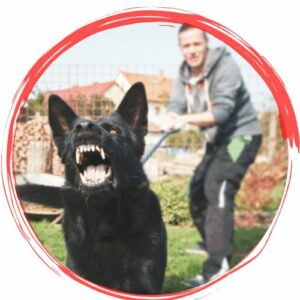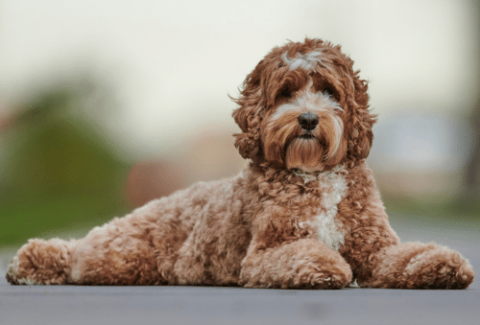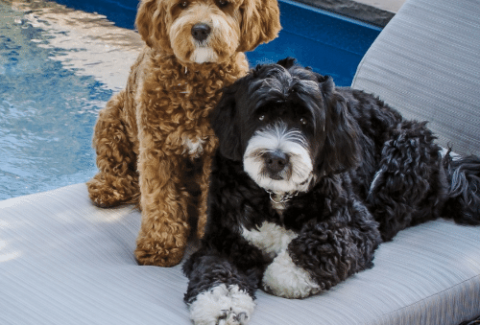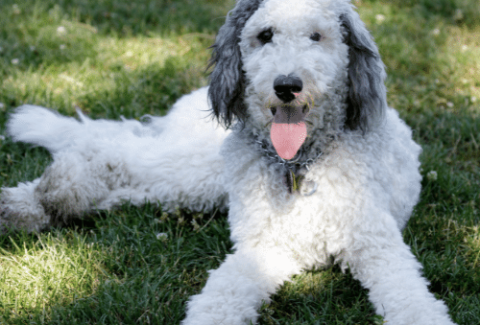Are Bernedoodles Good Dogs?
July 18, 2021 2021-08-24 9:45Are Bernedoodles Good Dogs?
A cross between a Bernese Mountain Dog and a Poodle, Bernedoodles offer the best of both worlds. As with every breed, they require training, proper care, socialization, and love to be the best dog they can be. Behavioral issues can occur over time if your Bernedoodle isn’t receiving the proper training and instruction necessary. Overall, they are very good dogs that make fun and loving family companions. Let’s take a look at what makes these dogs so special.
Table of Contents
What makes a Bernedoodle a good dog?
Different people have different ideas of what makes a good dog. Dogs have individual personalities, and what might be good to one person may not be good for someone else. As far as Bernedoodles are concerned, let’s break down three main factors for determining how easily this dog will fit into your home and lifestyle.
Temperament
When it comes to Bernedoodles, their typical temperament has been described as playful, affectionate, loving, and goofy. They love attention from humans and other animals and are known for being gentle with children.
Trainability
Some dogs are considered “bad” because they don’t respond as quickly to training as their human would like. With proper time and patience, any dog can be trained correctly and effectively and respond to commands.
It takes the right methods, approach, and attitude. Training a Bernedoodle is no different, and this is a dog that is already very intelligent due to his Poodle heritage. He’s also eager to please and enjoys learning. These characteristics make a Bernedoodle very trainable.
It’s important to provide this training to your dog to avoid any behavior issues in the future. Just as the Bernedoodle is intelligent enough to pick up good habits quickly, undesirable ones can be picked up just as easily if the dog isn’t shown the proper way to behave and doesn’t know what you expect from him.
Energy Level
If you’re a couch potato, you probably won’t do well with a dog that has a very high energy level and requires a lot of exercise to be happy.
This is something to keep in mind when choosing the right dog for you. Bernedoodles require a moderate amount of exercise and do best when they are active and social out with their human.
This definitely won’t be a lounge-all-day type of dog. You’ll need to make sure there is time each day for you to play with and exercise your Bernedoodle.

History of the Bernedoodle
The Bernedoodle was first bred intentionally in 2003. Crossing a Bernese Mountain Dog with a Poodle, the hope was to create a companion dog for families with children and other pets.
When you cross these two breeds, you combine the characteristics of both, while decreasing the risk of breed-specific health issues. A Bernese Mountain Dog is known for being:
- Intelligent
- Hard-working
- Loyal
- Gentle
- Friendly
- Social
- Playful
- High-shedding
- Prone to certain health issues, like hip dysplasia and hypothyroidism
Poodles are known for being:
- Intelligent (regarded as one of the most intelligent breeds in the world)
- Low-shedding with curly fur
- Friendly with kids and other animals
- Playful
- Highly trainable
- Lovers of water
- Good hunters
- Prone to certain health issues like bloat, hypoglycemia, hip dysplasia, and epilepsy
When you combine these two breeds to create the Bernedoodle, you get an adorable dog that is ideal for families.
Intelligent and playful with curly fur with different markings and coloring of a Bernese Mountain Dog, the Bernedoodle ranks high in the cuteness category. While they are sought after in part due to their low-shedding coat, don’t believe that the Bernedoodle doesn’t shed at all!
They will still shed, although minimally, thanks to their Poodle parentage. The Bernedoodle also loves water, active playing/running, and cuddling with their family members.
While both Bernese Mountain Dogs and Poodles are prone to hip dysplasia, the Bernedoodle has his risk for other health conditions of each breed cut significantly. They are regarded as healthy dogs with a longer life expectancy than both of their parent breeds.
The Bernese Mountain dog is expected to live around 8 years, being a large dog that experiences genetic health conditions as he ages. A Poodle is expected to live around 12-15 years. The Bernedoodle has a life expectancy of 10-14 years.
Caring for a Bernedoodle
A dog is only as good as he is allowed to be. In order for your dog to succeed, he needs a good start at home with an owner who understands his needs. If you provide your dog with encouragement, training, affection, and care, you will reap the rewards a good dog has to offer.
If you are interested in a Bernedoodle, there are a few things to know first in order to help make him the best dog he can be.
Social & Friendly
A favorite trait of this breed is his desire to be with people. If you are away for long hours during the day without a dog walker, friend, or family member coming by to socialize with your dog and give him a break from loneliness, you will end up with a very unhappy dog.
These social dogs do best when they can interact with people they love.
If they are left alone for too long, they can develop separation anxiety and start poor habits such as chewing on furniture or incessant barking.
Active & Athletic
Bernedoodles enjoy being outside and love to run, hike, and even swim. They also love the snow, having inherited the Bernese Mountain Dog’s love for colder weather.
If you aren’t the outdoorsy type, a long walk each day or a fenced-in yard for your dog to run around in will do just fine.
Grooming & Care
This dog requires grooming, having a coat that curls and is prone to matting. Regular brushing can keep some matting at bay, but regular haircuts and baths are necessary to keep his coat healthy.
If you don’t want to tackle this yourself, your local groomer can offer these services. Don’t forget the nail trims!
Training & Socialization
Proper training and socialization are necessary to help your dog know how you want him to behave and be comfortable around people. A Bernedoodle wants to please his owner and is happy when he succeeds in doing so.
They usually get along very well with other dogs, and can even become friends with smaller animals such as cats (of course, always under supervision).

The bottom line
Adding a Bernedoodle to your family is sure to bring you lots of joy. With their silliness, playfulness, and affectionate nature, this easy-going dog is fun for everyone. Good with small kids and other pets, the Bernedoodle combines the best aspects of the Bernese Mountain Dog and Poodle. With this breed, you get a dog that is energetic, intelligent, playful, and easily trained.
While the Bernedoodle is intelligent and picks up new, favorable habits quickly, be sure to provide training and socialization so your dog doesn’t also pick up a few bad habits. It’s important to show your dog the behavior you want from him and regularly encourage him to exhibit it. He’s happy to learn new things and execute them correctly.
When left to his own devices, your dog can get sad and lonely. This incredibly social and affectionate dog craves human interaction. Undesirable behavior can occur if your dog is left alone for long hours, such as chewing, barking, howling, and destroying things.
Provide your dog with the proper amount of exercise to keep him healthy and content. He’s happy to go on a walk with you or chase a ball in the backyard.
Regular grooming will keep your Bernedoodle looking and feeling his best. A haircut, cleaned coat, and trimmed nails will help his skin stay hydrated and keep painful mats from forming in his fur. It will also keep the fur out of his eyes so he can see! Bernedoodles can get a little shaggy over time.
Bred to be a family dog, the Bernedoodle has proven it is an ideal companion, loyal family dog, and lovable addition to any home.

Author: Jessica Rossetti
Jessica lives in Chicago with her husband, Dominic, and their rescued cat, Toast. She has lived with dogs for over 30 years and spends her days writing, caring for various animals, and enjoying her backyard that has become an oasis for wild creatures.
Her passion for animals began at a young age when she would bring home the lost dog or cat. As she got older, she went on to bring home an injured bird or raccoon. This love and desire to help all creatures led to her work as an adult with various animal rescues, where she saved the lives of many domestic and wild animals while learning the necessary skills to care for them.
Owning and operating a professional pet care service in Chicago for the past twelve years, Jessica cares for dogs in her home while writing full-time.
Steffi Trott
Related Posts
Are Labradoodles High-Maintenance?
At what age do Labradoodles calm down?
Are Pomeranians Good for First-Time Dog Owners?
Are German Shepherds Hypoallergenic?
Are German Shepherds Smart?
Are German Shepherds Vocal?
Are German Shepherds Good With Kids?
Do Bernedoodles like Water?
Do Bernedoodles Like Cats?
How Long Can Australian Shepherds Be Left Alone?
Check out our effective and affordable online dog training courses!
-
Sale Product on sale
 Tackling Reactivity Bundle
Tackling Reactivity Bundle
MONEY BACK GUARANTEE$564.00$49.00 -
Sale Product on sale
 Perfect Obedience Bundle
Perfect Obedience Bundle
MONEY BACK GUARANTEE$349.00$49.00 -
Sale Product on sale
 Ultimate Puppy Bundle
Ultimate Puppy Bundle
MONEY BACK GUARANTEE$416.00$49.00 -
Sale Product on sale
 The Perfect Focus Bundle
The Perfect Focus Bundle
MONEY BACK GUARANTEE$445.00$169.00 -
Sale Product on sale
 Ultimate Masterclass Bundle
Ultimate Masterclass Bundle
MONEY BACK GUARANTEE$2,213.00$499.00











